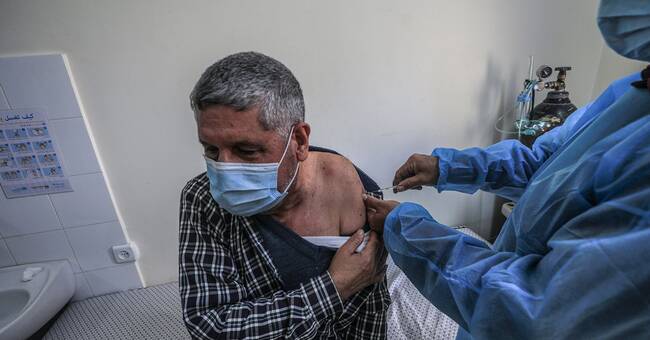Israel is a world leader in how quickly they have succeeded in vaccinating their population - more than half have received their first injection.
Now the government announces that it will send leftover doses to its allied countries in the world, such as the Czech Republic, Honduras, Guatemala and Hungary, reports the New York Times.
Is an expression of vaccine diplomacy
The donations can be seen as an expression of vaccine diplomacy, where countries that have vaccines try to reward or influence those who have little access to vaccines.
The vaccine that Israel has promised to its allies is given to them unconditionally.
But the vaccine can be seen as a gift to countries that have accepted Israel's sovereignty in Jerusalem, which both Israelis and Palestinians see as their capital, writes the New York Times.
But while Israel is giving large amounts of doses to residents on the other side of the world, their neighbors living in the Israeli-occupied territories of Gaza and the West Bank do not receive as generous offers.
“It is an oppressive system.
It says a lot about the regime that they are willing to send the vaccine halfway around the world, potentially to get something in return, and not offer vaccines to the millions of Palestinians living under Israeli oppression, "Salem Barahmehm, director of the Palestine Institute for Public Diplomacy, told New York Times.
Believes that Palestinian authorities can arrange their own health care
Israel has promised more than twice as many doses to countries abroad as it has promised to the five million Palestinians living in the West Bank and Gaza.
The government believes that it is up to the Palestinian Authority to organize its own health care.
At present, Israel has given 2,000 doses of vaccine to the Palestinian Authority and has promised another 3,000.
“A few weeks ago, it was still unclear if we have enough vaccine for our own people, but now that it seems to be the case, we should just be more accommodating with our neighbors.
"The virus does not stop at the border, and we have strong interests in the Palestinians being able to cope with the virus," Mark Regev, an adviser to Prime Minister Benjamin Netanyahu, told the newspaper.
MSF critical of handling
But MSF believes that Israel must systematically organize a vaccination program in the occupied territories, instead of sporadically sending a few thousand doses at a time.
They refer to the Geneva Convention, which states that the occupying states must maintain health care, even during pandemics.
In mid-March, less than two percent of Gaza and the West Bank residents were vaccinated, according to Médecins Sans Frontières.
“We are very concerned about the late and slow vaccination.
Because there is such a large supply of vaccines, Israel now has the opportunity to achieve herd immunity.
Nevertheless, they have no intention of helping to improve the vaccination rate in the Palestinian territories, "wrote Ely Sok, Director of Médecins Sans Frontières in the Palestinian Territories, on the website.
Watch The World of Science "The Vaccine and the Mutations" on Monday 26 April at 20.00 on SVT2 and on SVTPlay.

